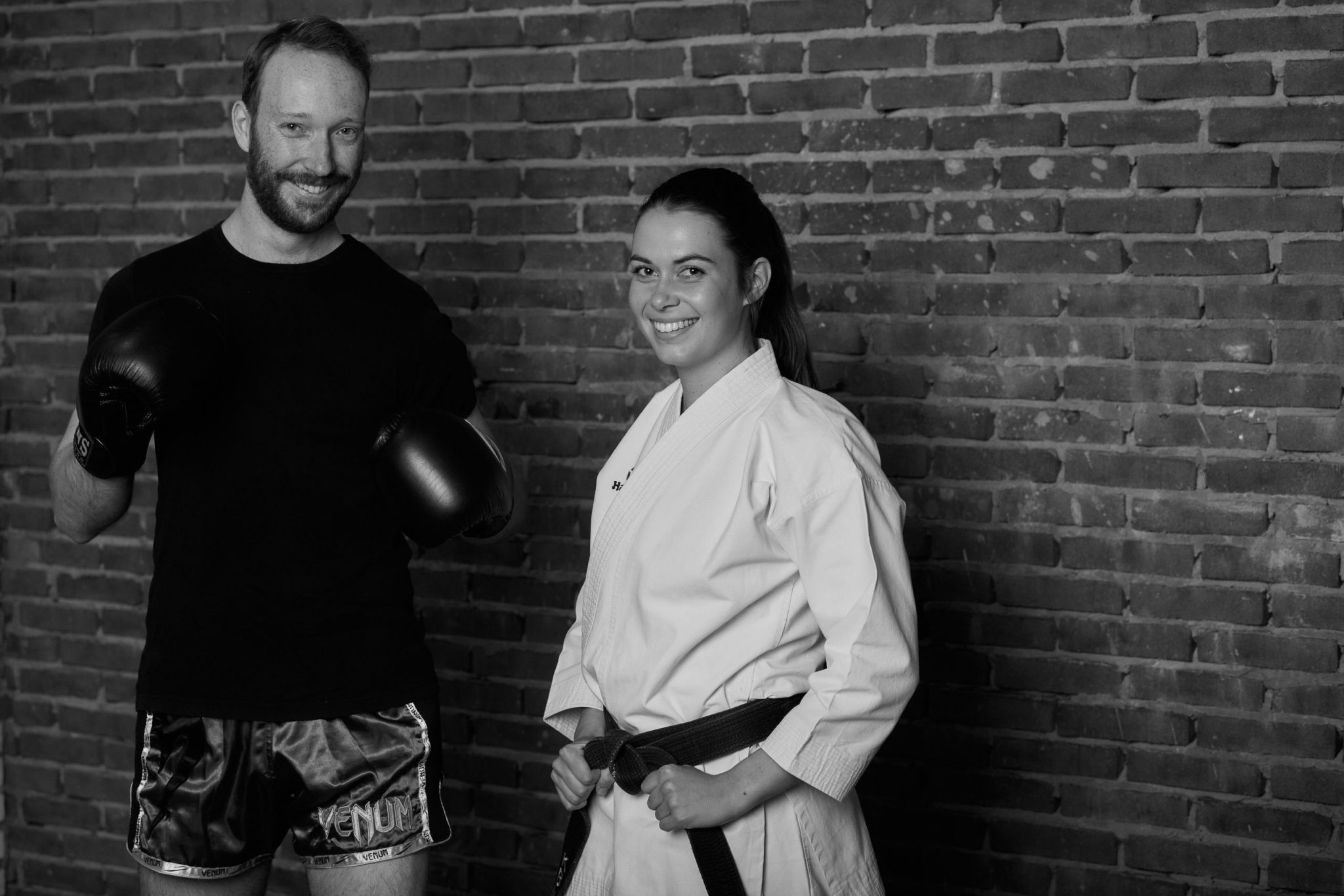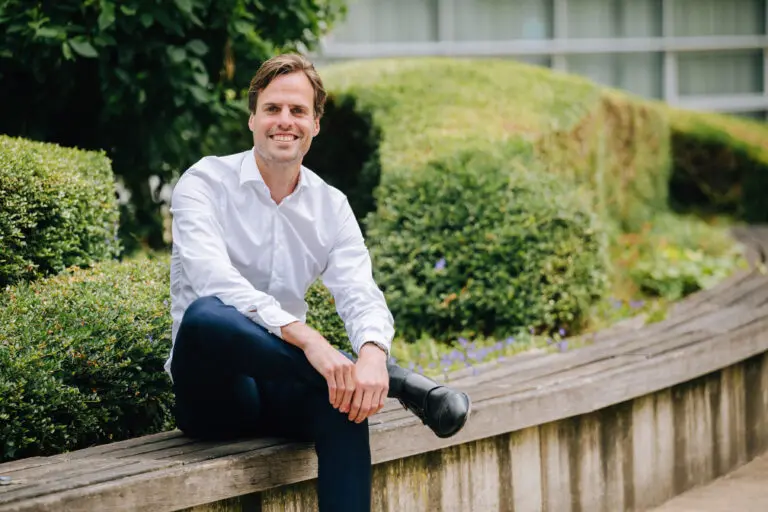Ontvang 4x per jaar het laatste nieuws rond IT en dienstverlening.
People who excel at sports at a high level often have unique qualities. A top athlete who has to deliver when the pressure is on, for example, has to make many sacrifices and needs staying power. Always with your eyes on the prize, constantly working towards that one goal: to be the best, and then even better. And these same qualities are not incongruous with the workplace. ITDS is not without its champions, such as Associate Business Consultants Rinaldo and Danique. Although he has since retired from top-level sport, Rinaldo was once Dutch Champion in pencak silat and Thai boxing. Danique, for her part, was Dutch Karate Champion and still nurtures international ambitions for the coming years. In this interview they tell all about their life as top athletes, from preparing for competitions and taking rain-checks on parties, all the way to the zenith: being Dutch champions!

How did you guys get into martial arts?
Danique: “I took up martial arts when I was seven. Because I was so insecure in school I thought it would boost my self-confidence. I started by taking a trial lesson in judo, but I didn’t like it much. My father had done karate, so that was my next step. My parents said I could stop once I got my yellow belt, but I loved it so much I just kept going.”
Rinaldo: “I was insecure as a child too, so my father “introduced” me to martial arts when I was eight. I didn’t really want to at first, but after watching a few Bruce Lee films I relented. I started with pencak silat, an Indonesian martial art. However, the sparring was painful, so I started and continued solely along the demonstration direction. But by the time I was about 12, I was enjoying the fighting aspect much more and I got better. And, of course, the better you get the less blows you have to take! My first matches were in pencak silat, but to extend my base I also started Thai boxing.”
And how did you graduate to a professional level?
Rinaldo: “By then I was training about four times a week. I was in the pencak silat national youth and I was invited to join the Thai boxing youth. At the time I fought national and international competitions in both disciplines and when I was 16 I won the under 70-kilos Dutch title. Afterwards, I focused completely on Thai boxing and fought several matches at senior level, including at the European Championships.”
Danique: “From the age of 11, I competed more, trained more and got better and better. By then I was practising two forms of karate, “kata” (simulated fighting) and “kumite” (sparring). When I was 16, I finished second in both forms in the Dutch national championships. Then I realised that if I wanted to become Dutch champion, I needed to concentrate on just one form. From then on, I focused only on kata and in 2017 I became Dutch under-21 Champion.”
What was the highlight of your career?
Danique: “Mine was the Dutch under-21 Championships. Afterwards, I also came second in the seniors. Then about two years ago I participated in my first “Series A”, a major international tournament, in Salzburg, Austria, where I competed with the best in the world to earn points to take part in Premier League tournaments.”
Rinaldo: “
Winning the Dutch title was also my highlight. And fighting at senior level, which also means that you fight without protection for the first time. There you are, with just your gloves and your mouthguard, facing someone who has trained just as hard as you have.”
How did you prepare for a big match?
Danique: “Je hele dagelijkse leven is hierop ingericht. Bijna iedere dag keihard trainen, niet naar feestjes gaan en bijvoorbeeld geen alcohol drinken. Vriendinnen weten ook dat ze een avond met mij ruim van tevoren in moeten plannen. Je wilt optimaal voorbereid zijn voor een wedstrijd, want op de mat moet het gebeuren.”
Rinaldo: “I couldn’t agree more. But I also had to keep an eye on my weight. I fought in the under-75-kilo weight class, while my normal weight was about 80 kilos so I had no choice but to follow a strict dietary regime. Before a competition there was always a weigh-in and if I wasn’t on weight I’d run around in circles wearing a binbag to lose those last grams. Then, after the weigh-in, I’d gorge on fried rice to rebuild my strength. Aside from the training, that was one of the most difficult aspects of fighting at such a high level.”
Are there any similarities between your work and your sporting careers?
Danique: “Quite a lot actually. Among other things, is the ability to plan well. This has been particularly important during the past few years, when I was combining training with a master’s degree and my work. And, of course, perseverance is another quality. You always want to be the best and then get even better. This was my mindset while I was studying and it’s something I now notice in my work at ITDS.”
Rinaldo: “I’m with Danique here too. Training can often be tedious and the days very repetitive. Running in the morning, then studying, and then training in the evening. Then multiply it all by six days a week. You certainly need staying power and you have to learn to deal with setbacks. You might have to train for six months for just three minutes in the ring. And if you lose the match, it’s a huge big disappointment. But you always have to pick yourself back up and keep going.”
How do you see your future in martial arts?
Danique: “I’m still in the Dutch team and I train every day. This has been relatively easy to combine during corona, but I’m curious how it’ll pan out when “normal life” resumes. It will certainly be more difficult with international competitions, but that’s a bridge I’ll cross when I come to it. My goal is to hold on to my place in the Dutch top during the next few years and perform internationally too. At the moment I have a second Dan (second black belt) and in two years I’d like to get my third Dan (third black belt). This will mean a lot of training, so I will still have my work cut out. In addition, I’m also training to become an assistant karate teacher and that’s really something I’d like to continue.”
Rinaldo: “I already quit at a professional level. And coming from a position in which I trained five or six times a week, it really does feel like cold turkey. At the moment I train twice a week. I’d quite like to scale this up, but I won’t be doing it competitively anymore. It’s not really something that can be combined with work; you’d raise a few eyebrows if you showed up to a business meeting with a black eye! I’d like to train children though, to let them experience what I did when I was younger.”
If, like Danique and Rinaldo, you have a healthy dose of ambition, at ITDS we’re always on the lookout for new colleagues who are up for a challenge. So why not kickstart your career, with a traineeship, for example. Apply now!




